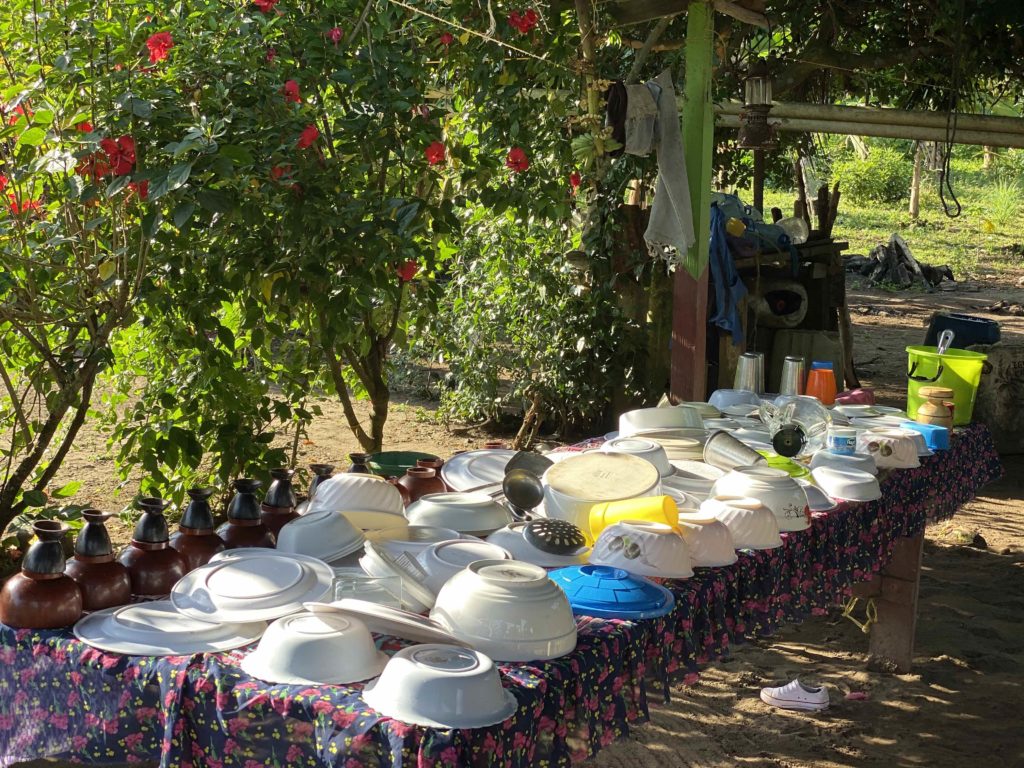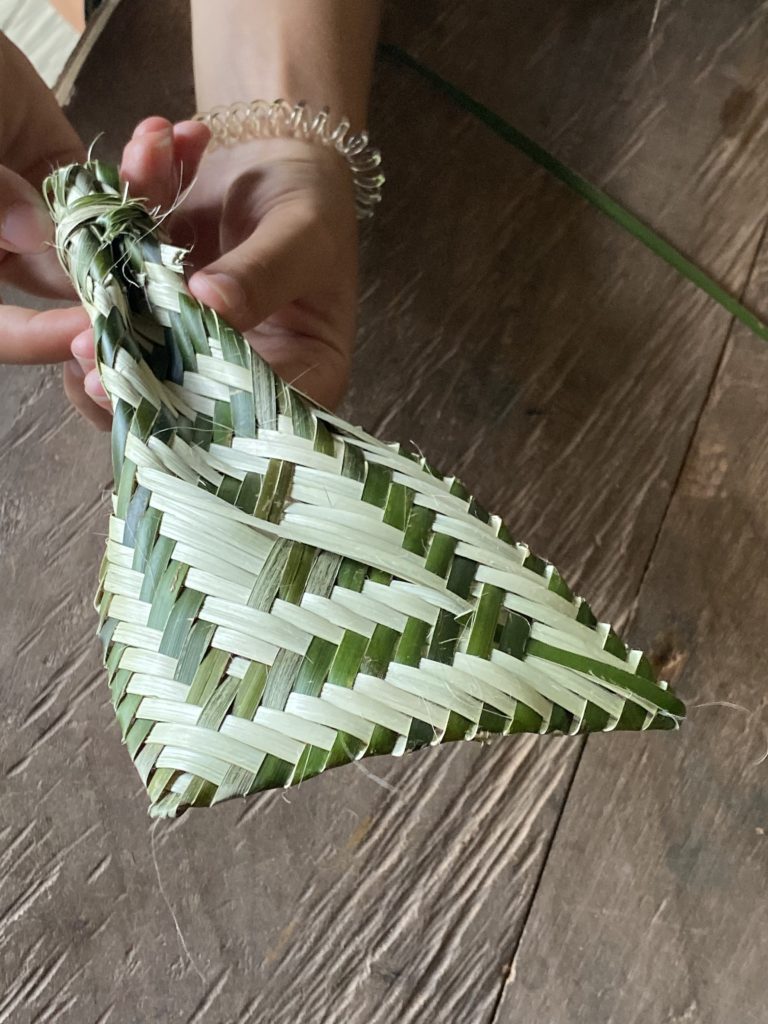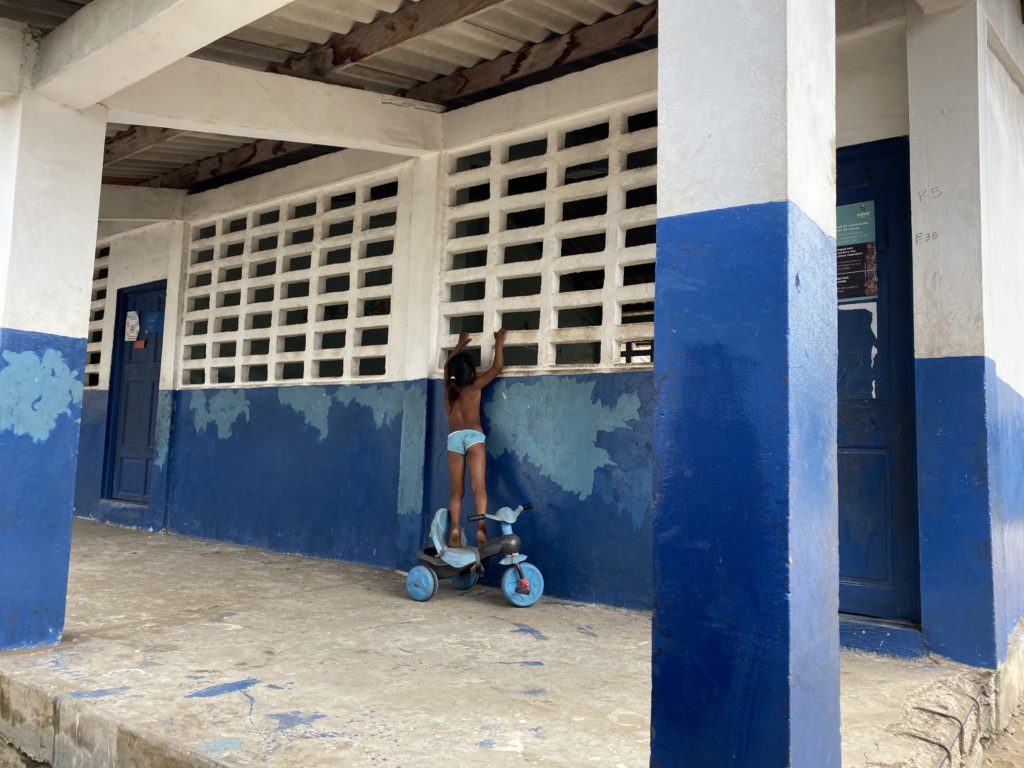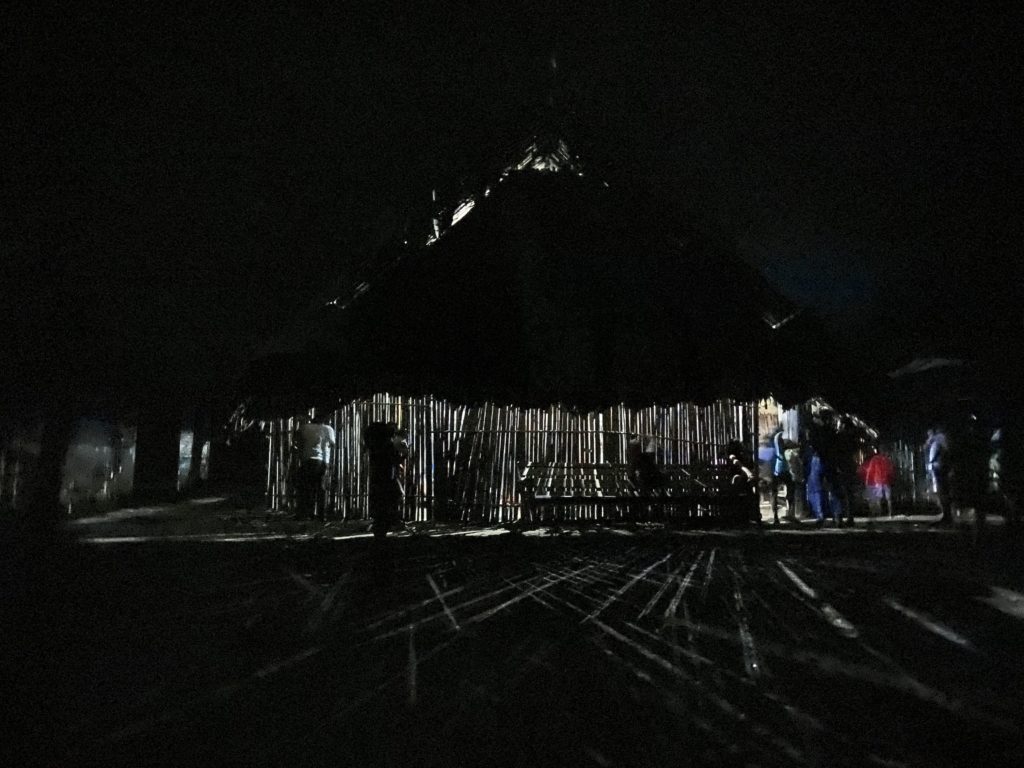Caroline thinks she has cat pee on her sheets. Nobody wants to smell the sheets to verify.
The aftermath of last night’s party is an entire table of dishes set out to dry.

The mosquitoes are getting worse. Everyone has multiple strings of bites down their legs and on their feet. These are tiny mosquitoes, unseen, unheard. We think they are sandfly bites.
There’s a large cockroach, la cucaracha, on a towel that Luis has hung to block the sun from coming in. He swats it to the floor but it returns to haunt us, leaping onto the breakfast table. Caroline spears it with a butter knife and it falls, writhing, to the ground. Luz stamps on it. Cockroaches are the only things she kills. I concur. Caroline remembers that when she lived in an apartment in her college days, one of her roommates had a cat who would trap cockroaches but not kill them. It would flip them on their backs in the kitchen. Switch on the light, and a dozen cockroaches would be spinning, hypnotic. There have been stranger ways of telling the time.
Luz tells us about the upcoming chicha ceremony and how the Guna bestow a name upon the girl, given it is her coming of age. Sometimes it is the same name they are given at birth, sometimes it is a new name altogether and it merges with the new name. Perhaps one is expected to be a new person with a new name. It is, after all, a parallel to baptism.
Luis Manuel Angel Gordo. Luis was his grandfather; Manuel and Angel were the names of his grandfather’s brothers. As the eldest grandson, he was given a triple barrel of the family tree. There are at least ten Luis’ in his entire family, Caroline has two nephews on either side of her family who are both named Brooks after Brooks Robinson, who was the first black baseball player to break the colour line. This caused a lot of friction on both sides, because one cousin accused the other of stealing her ‘idea’, as if a name is something copyrighted.
And I talk about my middle name, Daniel, how my brother and I both carry it and how my father changed his name when we were kids to call himself Daniel too. What does it mean to carry the names of your family? To hold the weight of older times, to feel strange memories when you are called in a certain way. Names that sing of stories beyond us, that carry expectation, animosity. Names that are places. The weirdest name I have ever come across was No.14 Bus Shelter. True story. I don’t use my middle name much. Somehow I feel that it takes up too much space. I like my name short, economical. Daniel is the name that I leave to my father.
In the afternoon, we have the privilege to try our hands at weaving a small fan that is used to stoke fires, or to keep cool on a warm day. Acario, one of the village weavers, brings a bundle of reed-like strips. They have been sliced to precision from the branch (or stem?) of the niwa tree. He proceeds to expertly fold a lovely pattern and shapes it into a tiny fan. It is a joy to watch but I can’t quite follow the warp and weave. The patterns all blur into one for me. It’s great for Charlotte, though. She studied weaving and for her, this is chicken feet. I do my best but end up with… a triangle. I literally twist the ends together and cut my losses. It’s a…. usable coaster? If you don’t mind the sharp edges! But I also buy a fan to remind myself of Acario’s mastery.

Richard Kearney, in his introduction to Gaston Bachelard’s “The Poetics of Space” writes, “Poetics comes from poiesis, meaning “to make,” and for Bachelard this is a two-way process: we are made by material images that we remake in our turn. We are inhabited by deep imaginings—visual and verbal, auditory and tactile—that we inhabit in our own unique way. Poetics is about hearing and feeling as well as crafting and shaping. It is the double play of re-creation.”

I am just starting on Bachelard but already there is such resonance with how he sees everyday things. ‘Deep imaginings’ is that homage to being able to see the stanza as a unit of a poem and as a room. All we do is re-create what is already all around us. It is the craft of how we create that allows us to offer the signature of our thoughts and who we are.
Over dinner, everybody trades cat stories while taking turns to hold lluvia, the family cat. Her name means ‘rainfall’. Suddenly, I feel terribly sad thinking about how I won’t come home to the familiar sound of Chubs, his nuzzle on my legs, the way he would race through his tunnel or leap up for treats.
At night the sky is made of lightning clouds. Thunder is far away. Like errant children, left unsupervised, lightning leaps from cloud to cloud, shimmering the sky for brief moments. The heavy cloud cover keeps the stars away. I do hope it won’t rain tonight, though we seem to have passed the rainy period that marked the first few days of our stay.

The chicha music calls to us again, and we return to watch this powerful, yet gentle dance. The dancers are still rehearsing for the ceremony on Thursday, and tonight, some of the faces are different. Maybe they have an ‘A’ and a ‘B’ team. One of the dancers, Victor, offers to let us try his pipes. They are of varying lengths and all seven of them form a scale, although it is a different mode from the Western scale, something completely haunting. I can barely make a sound through one pipe and I am in awe of those boys, who are able to blow the same melody on a loop, while dancing, for up to ten minutes at a time.